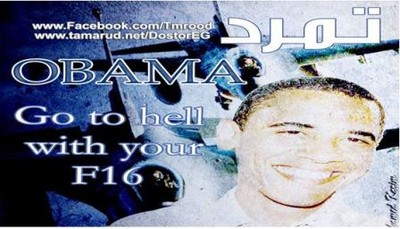Perceived American support for the Muslim Brotherhood in Egypt is driving a deep wedge between Egypt's military leaders and its people against the United States, a report from the Middle East Media Research Institute (MEMRI) finds.
"This trend is part of continually escalating anti-U.S. and, more specifically, anti-President Obama attacks on the part of supporters of Egyptian Defense Minister Al-Sisi, who deposed" President Mohamed Morsi in July, the report says. It is being fueled by President Obama condemnation of the military's assault on Muslim Brotherhood sit-in locations after Morsi's ouster, which left hundreds dead. The United States also canceled a joint military exercise and is still considering freezing military aid.
 Egypt's "Tamarod," or Rebel movement, made its thoughts about an American delay in sending F-16 fighter planes clear in a Facebook posting. |
The White House took a decidedly softer tone as Mohamed Morsi's government moved to consolidate power for the Muslim Brotherhood, and ram through a constitution which trampled rights for religious minorities and women.
That may explain why Obama is the target of the harshest commentary, with Egyptians "insulting his mother, calling him mentally deficient and his administration 'the Adolf Obama Reich,' and even going so far as to offer a prayer that he would die in agony," the MEMRI report says.
"You left the Egyptians. You turned your back on the Egyptians, and they won't forget that," Egyptian Gen. Abdul Fattah al-Sisi told The Washington Post in his first interview since Morsi's ouster. The newspaper described it as "a measure of just how thoroughly the Obama administration has alienated both sides in a profoundly polarized and unsettled Egypt."
As we've noted throughout his administration, President Obama too often relies on advisors with clear sympathies toward the Muslim Brotherhood and Islamist ideologies. For example, Dalia Mogahed, then-president of the Islamic Society of North America (ISNA) – a group formed by Muslim Brotherhood members in the United States, was deemed the "most influential person" shaping the Obama Administration's Middle East message.
Rashad Hussain, President Obama's special envoy to the Organization of Islamic Cooperation (OIC), has close ties with ISNA and been critical of U.S. prosecutions for terror supporters. For more examples, click here.
As is the case with Syria, when American prestige and influence wanes, Russia seems to benefit. As much as Egyptians attack Obama, they seem to be embracing Vladimir Putin.
To read the MEMRI report and see some of the examples, click here.


